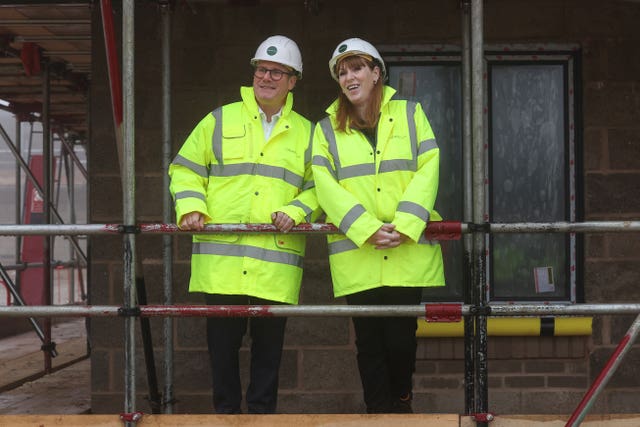Rayner to promise ‘devolution by default’ in speech to local leaders
The Deputy Prime Minister will vow to push power out of Whitehall and into the hands of people with ‘skin in the game’.

Angela Rayner will promise to make devolution the “default setting” for councils across the country after senior Government figures warned they could overrule local authorities’ objections to push through key building plans.
In a speech to regional leaders, the Deputy Prime Minister will vow to push power out of Whitehall and into the hands of people with “skin in the game” across a range of policy areas including housing.
The Government’s devolution White Paper will be published on Monday, which Ms Rayner has said will ensure regional powers are “no longer agreed at the whim of a minister in Whitehall”.

Ms Rayner’s Ministry of Housing, Communities and Local Government said Labour’s devolution policy will allow regional leaders to “guide” development projects “across areas, housing, transport and skills”.
England’s regions will be “centre stage” in the Government’s mission to grow the economy and build 1.5 million homes, she is expected to say.
Ms Rayner, who is also Housing, Communities and Local Government Secretary, will promise the White Paper, which will set out devolution policy in greater detail, will be a “turning point.”
“When our proud towns and cities are once again given the powers they need to drive growth and raise living standards as part of our Plan for Change.
“It’s a plan for putting more money in people’s pockets, putting politics back in the service of working people and a plan for stability, investment and reform, not chaos, austerity and decline, that will deliver a decade of national renewal.
“Devolution will no longer be agreed at the whim of a minister in Whitehall, but embedded in the fabric of the country, becoming the default position of Government.”
Proposals to create so-called “strategic authorities” across England, bringing together councils in areas where people live and work, will be among the measures outline.
The ministry said this would help “to avoid duplication and give our cities and regions a bigger voice”.
However, the Local Government Association – the membership body for authorities in England and Wales – warned that any changes would need to put councils “at the heart of decision-making”.
“In a very centralised country, moving funding and power from Whitehall to local leaders is needed but it must be done in a way where empowered councils and the communities they serve are at the heart of decision-making,” it said.
“Reforms in this White Paper will have a significant impact on every council and community. While our members are – and always have been – open to change, we remain clear that local government reorganisation should be a matter for councils and local areas to decide.”
The association warned that devolution was “not an end in itself” and “cannot distract from the severe funding pressures that are pushing local services to the brink,” repeating its call for compensation changes to employer national insurance contributions announced in the Budget.
Simon Kaye, policy director at think tank Reform, said: “This White Paper is a very welcome start but will not on its own deliver the promised ‘devolution revolution’.
“Genuinely ‘strategic authorities’ require powers of a different order of magnitude – including serious tax-raising powers.”
He added: “There is also a risk that plans to abolish district councils will leave local neighbourhoods feeling even more neglected. The result of reforms cannot be simply the creation of ‘mini Whitehalls’ at a regional level – communities need a real say.”
The Conservatives accused the Labour Government of plans to “strip councils of their powers to make choices and to impose reorganisation from Westminster without local consent”.
A party spokesman said: “The Conservatives delivered over 1 million new homes in the last parliament, and whilst we recognise the need to build more, these must be in the right places.
“This new announcement will do nothing to solve that – and instead open up another front on Labour’s assault on the countryside.”
Last week, the Government launched a major overhaul of national planning policy which will give councils mandatory targets to deliver a total of 370,000 homes a year in England.
Sir Keir Starmer and Ms Rayner have pledged to build 1.5 million homes and take decisions on 150 major infrastructure projects this parliament.
Energy Secretary Ed Miliband has said ministers will have the final say in approving large onshore wind farms rather than local authorities, some of which have robustly opposed development.
Meanwhile, Justice Secretary Shabana Mahmood indicated the Government was ready to bypass challenges to its plans to build four more jails and find a total of 14,000 cell spaces to grip the prisons overcrowding crisis.
The national planning policy commits to a “brownfield-first” strategy but councils will also be ordered to review their greenbelt boundaries to meet targets by identifying lower-quality “greybelt” land that could be built on.
The Government announced £100 million of additional cash for councils, along with 300 additional planning officers, to speed up decision-making processes.
The Government’s full devolution proposals will be set out in a White Paper, due to be published in Parliament on Monday.





